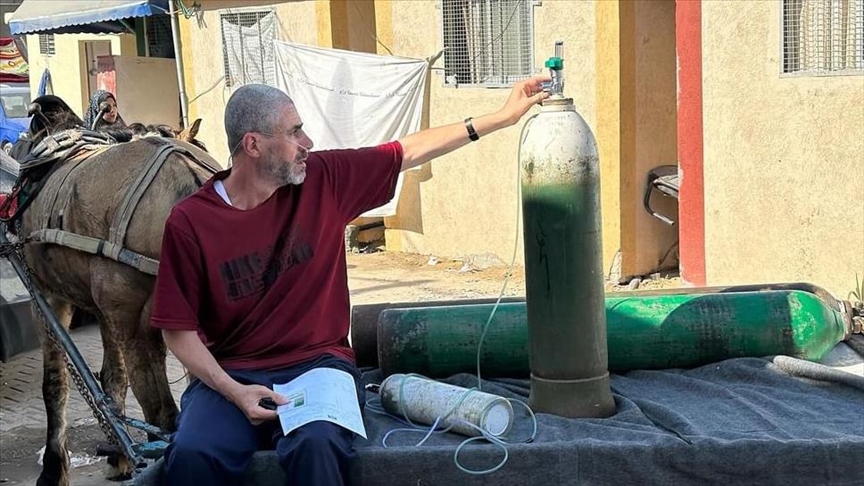Primitive era returns to Gaza because of lack of fuel
Donkey-driven carts used as main transportation tool as cars running out of fuel

JERUSALEM
Hospitals, ambulance services, telecommunications companies and civil defense teams are the most affected sectors in the Gaza Strip because of the lack of fuel that has caused disruptions to vital services across the enclave.
On Wednesday, 25,000 liters of fuel entered Gaza from Egypt for the UN Palestinian Refugee Agency, or UNRWA, operations -- the only quantity that entered Gaza since Oct. 7 as other sectors suffer from a lack of fuel.
The Gaza Strip needs 12 million liters of fuel on a monthly basis, according to the Petroleum Public Commission of the Palestinian Finance Ministry.
Gaza also needs 12 million liters of industrial fuel for its power plant and hospitals.
It ministry said the quantity that arrived for UNRWA is less than 0.2% of Gaza's monthly fuel need.
Fuel is also needed to pump water and to treat sewage water as well as for telecommunications companies to keep their services functioning.
Lack of fuel
Gaza is living in a complete blackout as its only power plant was forced to shut down because of a lack of fuel whereas quantities ran out in the first week of the Israeli war against Gaza.
While most cars are running out of fuel, several Palestinians were forced to use cooking oil to turn on their vehicles.
The monthly fuel quantities used to enter Gaza is 10 million liters from Egypt while the remaining quantity, 2 million liters, enters from Israel.
As for industrial fuel, it all comes -- the 12 million liters -- through Israel under coordination with Qatar on a monthly basis.
Primitive life
Amid a lack of fuel, and consequently a lack of electricity, the primitive aspects of life began to resurface in Gaza to overcome difficulties caused by the war and complete siege.
Families, as well as civil defense rescue teams, are using simple tools to remove victims from the rubble, especially decomposed bodies that spread a rotten smell.
Residents have returned to using wood to cook and heat.
Donkey-driven carts are also becoming the main tool for transportation instead of cars, especially for those fleeing northern Gaza toward the south.
As most water well stations are shut down due to a lack of electricity and fuel, Palestinians living close to the beach use the water for showers and for cleaning clothes.
Others are reportedly adding sugar to seawater or boiling it to use for drinking and cooking.
Israel has launched relentless air and ground attacks on the Gaza Strip since a cross-border attack by the Palestinian resistance group, Hamas, on Oct. 7.
Since then, more than 12,000 Palestinians have been killed, including over 8,300 women and children, and more than 30,000 others have been injured, according to the latest figures.
Thousands of buildings, including hospitals, mosques and churches, have also been damaged or destroyed.
The Israeli death toll, meanwhile, is around 1,200, according to official figures.
*Writing by Ahmed Asmar
Anadolu Agency website contains only a portion of the news stories offered to subscribers in the AA News Broadcasting System (HAS), and in summarized form. Please contact us for subscription options.







